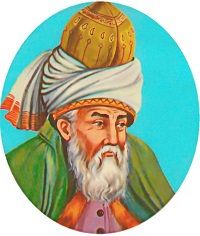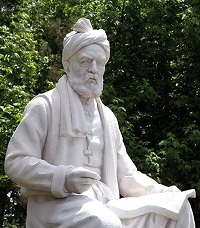From Ferdowsi to Hafiz, Persian poetry has been filled with wisdom and insight for centuries. Persian poets are some of the most renowned and beloved in the world. Their poetry is full of elegance, wit, and insightful observations about life, their words of wisdom continue to resonate with people centuries after they were written. Here are some of our favorite Persian poets quotes.
Rumi

Jalāl ad-Dīn Mohammad Rūmī, or more commonly known as Rumi, is considered the greatest Sufi mystic and poet in Persian language by many. He was born in 1207 in Balkh, part of the Khwarezmian Empire (present-day Afghanistan).
Rumi’s life experience full of longing, loss and love turned him to poetry. According to his philosophy, life is a journey to union with the one true God. To do that, one must practice love, live into that truth and then guiding others. Below are some of his most famous quotes.
1. “I learned that every mortal will taste death. But only some will taste life.”
2. “Don’t grieve. Anything you lose comes round in another form.”
3. “Raise your words, not voice. It is rain that grows flowers, not thunder.”
4. “Set your life on fire. Seek those who fan your flames.”
5. “Reason is powerless in the expression of love.”
6. “Be empty of worrying. Think of who created thought.”
7. “The lion is most handsome when looking for food.”
8. “To praise the sun is to praise your own eyes.”
9. “As you start to walk on the way, the way appears.”
10. “This is a subtle truth. Whatever you love you are.”
11. “Stop acting so small. You are the universe in ecstatic motion.”
12. “Yesterday I was clever, so I wanted to change the world. Today I am wise, so I am changing myself.”
Hafez

Khāwje Shams-od-Dīn Moḥammad Ḥāfeẓ-e Shīrāzī (1315-1390) was a Persian poet known by his pen name Hafez (also spelled Hafiz). He’s one of the greatest poets of Persia, his works are regarded by many as a pinnacle of Persian literature.
Hafez’s poetry is characterized by his love for humanity and contempt for hypocrisy. Above all is his ability to relate normal daily experience to the mystic union with God. Persian people learn his poems by heart and use them as their every day proverbs.
1. “I wish I could show you, when you are lonely or in darkness, the astonishing Light of your own Being.”
2. “The words you speak become the house you live in.”
3. “Be content with what thou hast received, and smooth thy frowning forehead.”
4. “Fear is the cheapest room in the house. I would like to see you living in better conditions.”
5. “On the neck of a young man sparkles no gem so gracious as enterprise.”
6. “Greatness is always built on this foundation: the ability to appear, speak and act, as the most common man.”
7. “When all your desires are distilled you will cast just two votes: To love more, and be happy.”
8. “In time of trouble avert not thy face from hope, for the soft marrow abideth in the hard bone.”
9. “There is an ambush everywhere from the army of accidents; therefore the rider of life runs with loosened reins.”
10. “Even after all this time the sun never says to the earth, ’You owe me.’ Look what happens with a love like that, it lights the whole sky.”
Saadi
Saadi Shīrāzī (1210-1291) was a major Persian poet of the medieval period. He is better known by his pen name Saadi or Saʿdī. He grew up in a family of religious scholars in Shiraz, Iran.
The poet lived through one of the most traumatic centuries in the history of Asia and the Middle East. Mongol’s expansion of power at the time caused the destruction of civilizations, cultures and the mass migration of populations.
To survive, Saadi must had determination, wit and even luck. The hard times certainly had influenced his worldview as well as his works. Saadi’s poetry reflects his concern for the suffering of others and an awareness of the fragility of life. It also shows that the poet had a faith in a moral reckoning both in this life and the next.
1. “A little beauty is preferable to much wealth.”
2. “O wise man, wash your hands of that friend who associates with your enemies.”
3. “Whoever acquires knowledge but does not practice it is as one who ploughs but does not sow.”
4. “A man is insensible to the relish of prosperity till he has tasted adversity.”
5. “Let him who neglects to raise the fallen, fear lest, when he falls, no one will stretch out his hand to lift him up.”
6. “The greedy man is incontinent with a whole world set before him.”
7. “A handsome woman is a jewel; a good woman is a treasure.”
8. “He who is a slave to his stomach seldom worships God.”
9. “Obedience is not truly performed by the body, if the heart is dissatisfied.”
10. “Pride thyself on what virtue thou hast, and not on thy parentage.”
11. “A grateful dog is better than an ungrateful man.”
Omar Khayyam

Omar Khayyam (1048 – 1131) was not only famous for his poetry. The Persian poet was also a mathematician, astronomer, historian, philosopher, and polymath. Interestingly, Omar was known in his own country and time primarily for his achievements in science, not poetry.
Omar’s poems had not attracted a lot of attention, some even doubted that he wrote poetry. It was not until an English writer named Edward FitGerald wrote The Rubáiyát of Omar Khayyám that people started to notice about Omar Khayyam literary works. His quatrains have been translated into many major languages since then and forming a large part of people ideas about Persian poetry.
1. “The thoughtful soul to solitude retires.”
2. “Living Life Tomorrow’s fate, though thou be wise, Thou canst not tell nor yet surmise; Pass, therefore, not today in vain, For it will never come again.”
3. “I often wonder what the vintners buy one half so precious as the stuff they sell.”
4. “And that inverted bowl we call The Sky, where under crawling coop’t we live and die, lift not thy hands to It for help—for it rolls impotently on as thou or I.”
5. “Myself when young did eagerly frequent doctor and saint, and heard great argument about it and about: but evermore came out by the same door as in I went.”
6. “A hair divides what is false and true.”
7. “Drink! for you know not whence you came nor why: drink! for you know not why you go, nor where.”
8. “The moving finger writes, and having written moves on. Nor all thy piety nor all thy wit, can cancel half a line of it.”
9. “The worldly hope men set their hearts upon turns ashes—or it prospers; and anon, like snow upon the desert’s dusty face, lighting a little hour or two—is gone.”
Ferdowsi

Ferdowsi, pseudonym of Abū al-Qasem Manṣūr (940-1019/1025) is one of the greatest figures in the history of Persian literature. The Persian poet is the author of Shāh-nāmeh (“Book of Kings”), one of the world’s longest epic poems created by a single poet.
Ferdowsi’s influence in the Persian culture is undisputable. For more than a thousand years later, Persian people still continue to read and listen to his work. His legacy still serves as a motivation behind many future Persian figures.
1. “And the blood of brave men was shed like unto the shedding of rain from a black cloud.”
2. “And now may the blessing of God rest upon all men. I have told unto them the Epic of Kings, and the Epic of Kings is come to a close, and the tale of their deeds is ended.”
3. “How shall a man escape from that which is written; How shall he flee from his destiny?”
4. “Helmet was joined to helmet, and spear to spear, and jewels, baggage, and elephants without number went with them, and you would have said it was a host that none could understand.”
5. “Now when the two armies met, many and fierce were the combats waged between them, and blows were given and received, and swords flashed and showers of arrows descended on all sides.”
Final thoughts
It is interesting to see how the wisdom of the Persian poets can still be relevant and applicable even in today’s world. The quotes we looked at provide insight into human nature, love, and happiness that are just as valuable now as they were centuries ago. We hope you enjoyed this collection of Persian poetry quotes and that they have inspired you in your own life.
- What Is Nonfiction Poetry? (+15 Best Nonfiction Poetry Collections)
- Puritan Poetry: How Did Poetry Connect With Puritanism?

Thomas Dao is the guy who created Poem Home, a website where people can read about all things poetry related. When he’s not busy working on his next project, you can find him reading a good book or spending time with family and friends.













